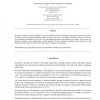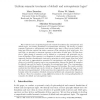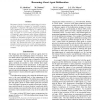155 search results - page 11 / 31 » Foundations of a Logical Approach to Agent Programming |
LPNMR
2004
Springer
14 years 2 months ago
2004
Springer
This paper develops a declarative language, P-log, that combines logical and probabilistic arguments in its reasoning. Answer Set Prolog is used as the logical foundation, while c...
IJCAI
1993
13 years 10 months ago
1993
The problem of representing and reasoning about two notions of time that are relevant in the context of knowledge bases is addressed. These are called historical time and belief t...
CORR
2000
Springer
13 years 9 months ago
2000
Springer
We revisit the issue of epistemological and semantic foundations for autoepistemic and default logics, two leading formalisms in nonmonotonic reasoning. We develop a general seman...
AAMAS
2011
Springer
13 years 4 months ago
2011
Springer
We present a family of sound and complete logics for reasoning about deliberation strategies for SimpleAPL programs. SimpleAPL is a fragment of the agent programming language 3APL...
SIGCSE
2000
ACM
14 years 1 months ago
2000
ACM
Classifying is a central activity in object-oriented programming and distinguishes it from procedural programming. Traditional logic, initiated by Aristotle, assigns classificatio...



